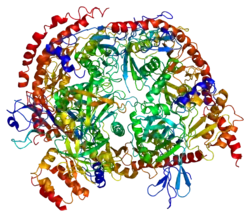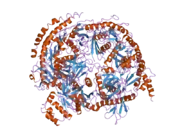Exosome component 8
Exosome component 8, also known as EXOSC8, is a human gene, the protein product of which is part of the exosome complex.[5]
Interactions
Exosome component 8 has been shown to interact with:
References
- GRCh38: Ensembl release 89: ENSG00000120699 - Ensembl, May 2017
- GRCm38: Ensembl release 89: ENSMUSG00000027752 - Ensembl, May 2017
- "Human PubMed Reference:". National Center for Biotechnology Information, U.S. National Library of Medicine.
- "Mouse PubMed Reference:". National Center for Biotechnology Information, U.S. National Library of Medicine.
- "Entrez Gene: EXOSC8 exosome component 8".
- Raijmakers R, Egberts WV, van Venrooij WJ, Pruijn GJ (Nov 2002). "Protein-protein interactions between human exosome components support the assembly of RNase PH-type subunits into a six-membered PNPase-like ring". J. Mol. Biol. 323 (4): 653–63. doi:10.1016/s0022-2836(02)00947-6. PMID 12419256.
Further reading
- Andersen JS, Lam YW, Leung AK, et al. (2005). "Nucleolar proteome dynamics". Nature. 433 (7021): 77–83. doi:10.1038/nature03207. PMID 15635413.
- Gerhard DS, Wagner L, Feingold EA, et al. (2004). "The Status, Quality, and Expansion of the NIH Full-Length cDNA Project: The Mammalian Gene Collection (MGC)". Genome Res. 14 (10B): 2121–7. doi:10.1101/gr.2596504. PMC 528928. PMID 15489334.
- Lehner B, Sanderson CM (2004). "A Protein Interaction Framework for Human mRNA Degradation". Genome Res. 14 (7): 1315–23. doi:10.1101/gr.2122004. PMC 442147. PMID 15231747.
- Ota T, Suzuki Y, Nishikawa T, et al. (2004). "Complete sequencing and characterization of 21,243 full-length human cDNAs". Nat. Genet. 36 (1): 40–5. doi:10.1038/ng1285. PMID 14702039.
- Strausberg RL, Feingold EA, Grouse LH, et al. (2003). "Generation and initial analysis of more than 15,000 full-length human and mouse cDNA sequences". Proc. Natl. Acad. Sci. U.S.A. 99 (26): 16899–903. doi:10.1073/pnas.242603899. PMC 139241. PMID 12477932.
- Raijmakers R, Egberts WV, van Venrooij WJ, Pruijn GJ (2002). "Protein-protein interactions between human exosome components support the assembly of RNase PH-type subunits into a six-membered PNPase-like ring". J. Mol. Biol. 323 (4): 653–63. doi:10.1016/S0022-2836(02)00947-6. PMID 12419256.
- Jiang T, Altman S (2002). "A protein subunit of human RNase P, Rpp14, and its interacting partner, OIP2, have 3′→5′ exoribonuclease activity". Proc. Natl. Acad. Sci. U.S.A. 99 (8): 5295–300. doi:10.1073/pnas.072083699. PMC 122763. PMID 11929972.
- Raijmakers R, Noordman YE, van Venrooij WJ, Pruijn GJ (2002). "Protein-protein interactions of hCsl4p with other human exosome subunits". J. Mol. Biol. 315 (4): 809–18. doi:10.1006/jmbi.2001.5265. PMID 11812149.
- Chen CY, Gherzi R, Ong SE, et al. (2002). "AU binding proteins recruit the exosome to degrade ARE-containing mRNAs". Cell. 107 (4): 451–64. doi:10.1016/S0092-8674(01)00578-5. PMID 11719186.
- Jiang T, Altman S (2001). "Protein–protein interactions with subunits of human nuclear RNase P". Proc. Natl. Acad. Sci. U.S.A. 98 (3): 920–5. doi:10.1073/pnas.021561498. PMC 14685. PMID 11158571.
- Brouwer R, Allmang C, Raijmakers R, et al. (2001). "Three novel components of the human exosome". J. Biol. Chem. 276 (9): 6177–84. doi:10.1074/jbc.M007603200. PMID 11110791.
- Williams JM, Chen GC, Zhu L, Rest RF (1998). "Using the yeast two-hybrid system to identify human epithelial cell proteins that bind gonococcal Opa proteins: intracellular gonococci bind pyruvate kinase via their Opa proteins and require host pyruvate for growth". Mol. Microbiol. 27 (1): 171–86. doi:10.1046/j.1365-2958.1998.00670.x. PMID 9466265.
This article is issued from Wikipedia. The text is licensed under Creative Commons - Attribution - Sharealike. Additional terms may apply for the media files.






